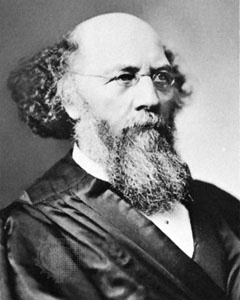 |
| Stephen Field |
"The power of exclusion of foreigners being an incident of sovereignty belonging to the government of the United States as a part of those sovereign powers delegated by the constitution, the right to its exercise at any time when, in the judgment of the government, the interests of the country require it, cannot be granted away or restrained on behalf of any one."What Justice Field omitted from his opinion was an actual provision of the Constitution granting Congress such power to exclude foreigners.
Now, you may be thinking, but the Constitution grants to Congress power over immigration. Well, not exactly. What the Constitution says is quite precise. The Constitution grants to Congress power to "establish an uniform Rule of Naturalization." Oddly, though it might seem otherwise, that provision alone, no other, states the nature of the power delegated by the States to the Congress with respect to such matters. There is no "Immigration Clause" in the Constitution, no express delegation of the power to restrain or encourage immigration to the United States anywhere in the Constitution. All there is is the Naturalization Clause, and nothing more.
The Naturalization Clause, for what it's worth, actually has to do with the decision by the States to grant to Congress the exclusive power to define how individuals could become citizens of the United States. Yet, in this case, using the florid and imprecise style of language common to many of these bad decisions, Justice Field presumptively includes the power to exclude foreigners within the general powers of the Congress. And, yes, the prose is florid:
The control of local matters being left to local authorities, and national matters being intrusted to the government of the Union, the problem of free institutions existing over a widely extended country, having different climates and varied interests, has been happily solved. For local interests the several states of the Union exist, but for national purposes, embracing our relations with foreign nations, we are but one people, one nation, one power. To preserve its independence, and give security against foreign aggression and encroachment, is the highest duty of every nation, and to attain these ends nearly all other considerations are to be subordinated. It matters not in what form such aggression and encroachment come, whether from the foreign nation acting in its national character, or from vast hordes of its people crowding in upon us. The government, possessing the powers which are to be exercised for protection and security, is clothed with authority to determine the occasion on which the powers shall be called forth; and its determinations, so far as the subjects affected are concerned, are necessarily conclusive upon all its departments and officers.
Sadly omitted from Justice Field's decision is constitutional writ, constitutional text, or arguments from them. His argument, instead, is a kind of organic demand of the nation at large. It says, in essence, "only the federal government can address" this question because of the expanse of the Nation and the variations of its interests.
Which Clause of the Constitution, you may ask yourself, is the one on which Fields' conclusions rest? The answer, unfortunately, can only be the Fields Clause. Because his decision repudiates the historic role played by the States in regulating migration into their borders by foreigners, and recognizes a sole power in the federal government to so regulate, I have added Justice Field's head to the Bag of Shame.